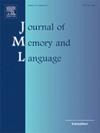从对话中附带学习 L2 单词的电生理学相关性
IF 3
1区 心理学
Q1 LINGUISTICS
引用次数: 0
摘要
我们的目的是确定在对话过程中偶然学习到的第二语言单词的电生理相关性,在一个真实但严格控制的实验范式中将记忆和第二语言习得研究联系起来。以荷兰语为母语的第二语言学习者在围绕价格比较的对话环境中,通过听觉输入学习他们以前不认识的英语单词(在 "隐藏 "的预测试中得到确认),同时我们测量了他们的脑电图。与已知单词相比,听到未知单词会引起早期和持续的负性,以及随后的 LPC,而 LPC 实际上可以预测随后的学习成功与否。值得注意的是,在第二个区块中,我们发现在前一个区块中刚刚学会的新单词的ERP与已知单词的ERP已经没有区别,而尚未学会的新单词仍然显示出与区块1相似的ERP特征。这支持了成人偶然 "拾起 "新的 L2 单词的快速学习机制。本文章由计算机程序翻译,如有差异,请以英文原文为准。
Electrophysiological correlates of incidental L2 word learning from dialogue
We aimed to determine the electrophysiological correlates of incidental L2 word learning during dialogue, bridging memory and second language acquisition research in a realistic, but strictly controlled experimental paradigm. Native Dutch speakers of L2 English learned English words previously unknown to them (as confirmed in a ‘hidden’ pretest) through auditory input in a dialogue-like setting revolving around price comparisons, while we measured their EEG. Hearing an unknown as compared to a known word elicited an early and sustained negativity, as well as a later LPC that was actually predictive of subsequent learning success. Notably, in a second block, we found that ERPs to novel words that had just been learned in the previous block were already undistinguishable from those for known words, while not yet learned novel words still showed similar ERP signatures as in block 1. This lends support for a fast learning mechanism in adults incidentally ‘picking up’ new L2 words.
求助全文
通过发布文献求助,成功后即可免费获取论文全文。
去求助
来源期刊
CiteScore
8.70
自引率
14.00%
发文量
49
审稿时长
12.7 weeks
期刊介绍:
Articles in the Journal of Memory and Language contribute to the formulation of scientific issues and theories in the areas of memory, language comprehension and production, and cognitive processes. Special emphasis is given to research articles that provide new theoretical insights based on a carefully laid empirical foundation. The journal generally favors articles that provide multiple experiments. In addition, significant theoretical papers without new experimental findings may be published.
The Journal of Memory and Language is a valuable tool for cognitive scientists, including psychologists, linguists, and others interested in memory and learning, language, reading, and speech.
Research Areas include:
• Topics that illuminate aspects of memory or language processing
• Linguistics
• Neuropsychology.

 求助内容:
求助内容: 应助结果提醒方式:
应助结果提醒方式:


